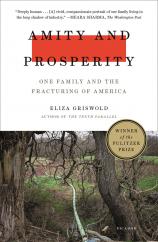Reading Group Guide
Discussion Questions
Amity and Prosperity: One Family and the Fracturing of America

1. Washington County was particularly vulnerable to the fracking industry because of poverty. What is at the heart of that poverty? Why isn’t it possible for the area to provide a good livelihood in America anymore?
2. In chapter two, “When the Boom Began,” Stacey signs a contract with Range Resources granting her the lowest possible royalty rate allowed by law (12.5%), minus a variety of Range expenses. If you had been in her situation, would you have signed the contract?
3. How are Harley’s physical health and emotional health intertwined? What accounts for the differences between the way he and his sister, Paige, experience their symptoms?
4. Chapter 19, “Policing the State,” describes the history of ACT 13, the Pennsylvania law that quashed local governments’ ability to regulate oil and gas operators. The law also required physicians to sign non-disclosure agreements in order to learn which chemicals had sickened their patients. As you read about the ensuing legal battle, culminating in key provisions of ACT 13 being declared unconstitutional, where did you place the blame for Stacey’s situation? Are voters the solution or the problem?
5. How does Pappy’s family history affect Stacey? What does the history of the region (particularly William Penn’s “holy experiment” and the eventual brutality between Native Americans and Scots Irish immigrants) teach us about the current power struggles between industry, government and rebels?
6. Hang ‘em High meetings were attended by an odd combination of Pennsylvanians who were united in the fight against Range Resources but disagreed about how and why. How did Stacey cope with the political contradictions in her community? Why would a conservationist reject environmentalists? Why aren’t scientists more politically empowered?
7. Access to clean water has always been a sign of freedom to Stacey, and her turn to water buffalos represented defeat. Is access to clean water a human right, or is clean water better understood as a commodity that might be bought?
8. The healthcare industry provided Stacey with a middle-class wage and is one of the few steady employers in her region. Yet she struggled to pay for the thousands of dollars in medical tests required for herself and her family. What does that say about the economics of illness in America?
9. Discuss the book’s title. What would it take to bring amity and prosperity to Washington County?
10. Stacey hoped for a settlement, but Harley was opposed to it. Would you have accepted a settlement?
11. What accounts for the tenacity of lawyers like the Smiths (who were willing to pursue cases against Range for years on a shoestring budget) and plaintiffs like Stacey? What keeps them from being easily intimidated or succumbing to despair?
12. Ron Yeager obtained a pre-drill test, but Buzz, Stacey and the Voyleses didn’t. If you were on a jury, what proof would you need of his water in order to be convinced about the cause of the contamination? If the liner of a drill cuttings pit or a waste pond is shown to be leaking, should that be sufficient evidence that the pit or pond is the source of toxins?
13. As you read about the suffering of Stacey’s animals (including the offspring of Boots and Diva), along with the tragic contamination of springs that flow from the Ten Mile Creek Watershed, how did the book shape your view of the natural world? How much responsibility do we have to protect the planet and its creatures, beyond what’s necessary for our own survival?
14. What did you discover about the way the energy industry weighs risk versus rewards? What would your life look like if humans stopped extracting minerals from the earth?
Amity and Prosperity: One Family and the Fracturing of America
- Publication Date: June 4, 2019
- Genres: Current Affairs, Environment, Nonfiction, Politics
- Paperback: 336 pages
- Publisher: Picador
- ISBN-10: 1250215072
- ISBN-13: 9781250215079







